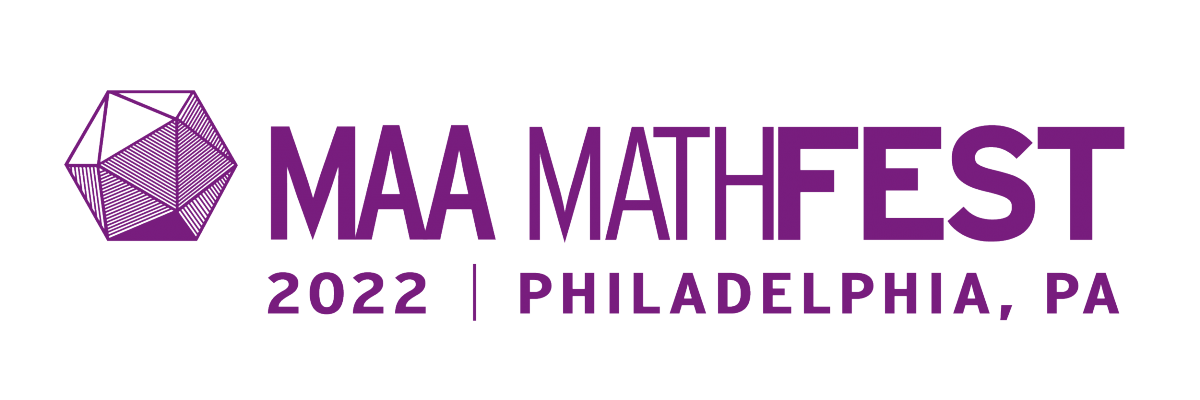- About MAA
- Membership
- MAA Publications
- Periodicals
- Blogs
- MAA Book Series
- MAA Press (an imprint of the AMS)
- MAA Notes
- MAA Reviews
- Mathematical Communication
- Information for Libraries
- Author Resources
- Advertise with MAA
- Meetings
- Competitions
- Programs
- Communities
- MAA Sections
- SIGMAA
- MAA Connect
- Students
- MAA Awards
- Awards Booklets
- Writing Awards
- Teaching Awards
- Service Awards
- Research Awards
- Lecture Awards
- Putnam Competition Individual and Team Winners
- D. E. Shaw Group AMC 8 Awards & Certificates
- Maryam Mirzakhani AMC 10 A Awards & Certificates
- Two Sigma AMC 10 B Awards & Certificates
- Jane Street AMC 12 A Awards & Certificates
- Akamai AMC 12 B Awards & Certificates
- High School Teachers
- News
You are here
Workshops

Please note: All sessions are listed in Eastern Daylight Time (EDT = UTC-4:00)
New Images of Online Math Instruction: Transitioning Research-Based Curricula into Online Environments
Thursday, August 4, 9:30 a.m. - 10:50 a.m., Salon C
Professional organizations are calling for active learning that engages students’ mathematical thinking. This can be challenging in an online environment. Participants will examine online lessons (from an NSF research project) that are cognitively scaffolded to advance students’ mathematical reasoning and understandings needed for learning calculus. Participants will leave the session with new images for designing online mathematics instruction.
Organizers:
Alan O'Bryan, Arizona State University, Rational Reasoning, LLC
Marilyn Carlson, Arizona State University
Building a Scholarly Mathematics Teaching and Learning Community
Thursday, August 4, 1:00 p.m. - 2:20 p.m., Salon C
This hands-on workshop provides college mathematics teachers training towards building a scholarship of teaching allowing them to step back and reflect systematically on their teaching including the coming year to promote active learning in their face-to-face, online, hybrid learning environments, facilitating to develop shareable teaching artifacts in a form that can be publicly reviewed and built upon by their peers.
Organizers:
Celil Ekici, Texas A&M University - Corpus Christi
Larissa Schroeder, University of Nebraska Omaha
Fei Xue, University of Hartford
Mako Haruta, University of Hartford
Learning from History: Teaching with Primary Source Projects in Your Mathematics Classroom
Thursday, August 4, 2:30 p.m. - 3:50 p.m., Salon C
This workshop gives participants hands-on experience teaching mathematics with primary historical sources. Participants will place themselves in the role of students as they work through guided readings and mathematical exercises based on historical sources. Participants will learn how to implement projects in their own classes and become acquainted with a collection of nearly 120 classroom-ready primary source projects.
Organizers:
Abe Edwards, Michigan State University
Dominic Klyve, Central Washington University
Danny Otero, Xavier University
Michael Saclolo, St. Edwards University
Sponsor:
SIGMAA on the History of Mathematics (HOM SIGMAA)
Innovations and Inspirations In Math Teaching: The Rosenthal Prize
Thursday, August 4, 4:00 p.m. - 5:20 p.m., Salon C
For 10 years, the Rosenthal Prize, sponsored by the National Museum of Mathematics, has identified engaging, hands-on, replicable lessons for students in grades four through eight. Experience some of these lessons, see how they draw on and can be used in university classes and other settings, and learn how you too might win $25,000 with a lesson of your own!
Organizers:
Ralph Pantozzi, Kent Place School / National Museum of Mathematics
Cindy Lawrence, National Museum of Mathematics
Cultural Competency: Providing Equitable Math Instruction through Cultural Relevance
Friday, August 5, 9:00 a.m. - 10:20 a.m., Salon C
Scores from the National Assessment of Educational Progress suggest that if current educational practices in math classrooms remain the same, the achievement gap between Caucasians and African descent demographics will be eliminated in approximately 217 years. To close the academic achievement gap for all students, teachers must be equipped with methods to conduct equitable instruction that is culturally relevant. In this session, attendees will learn methods for providing cultural relevance within specific academic settings. Participants will be empowered with strategies that will engage students in a relevant manner as well as acquire pedagogy, perspective, and practices to implement in the math classroom.
Organizers:
India White, Big Ideas Learning
Introducing COMAP’s Certificate in Modeling (CiM) Program
Friday, August 5, 1:00 p.m. - 2:20 p.m., Salon C
Participants will gain a hands-on introduction to COMAP’s CiM program as they learn key aspects of the modeling process and work together to solve a modeling problem. The workshop will conclude with a discussion about future opportunities to learn more about mathematical modeling, including information on how participants can enroll in CiM courses to work towards obtaining a modeling certificate.
Organizers:
Kayla Blyman, Saint Martin's University
Daniel Teague, North Carolina School of Science & Mathematics
Michelle Isenhour, Consortium for Mathematics and Its Applications (COMAP)
Kathleen Snook, Consortium for Mathematics and Its Applications (COMAP)
Sponsor:
Consortium for Mathematics and Its Applications (COMAP)
Using Excel to Make Service Courses More Effective
Friday, August 5, 2:30 p.m. - 3:50 p.m., Salon C
In “the last math course the student will take,” we emphasize modeling and template construction by incorporating spreadsheets. Class tested samples will be provided. Courses include College Algebra and Business Calculus. Include discussions on ways spreadsheets differ from calculators. Supported by NSF SUMMIT-P grants. Consistent with MAA’s CRAFTY recommendations. No Excel experience assumed. Bring laptop for active participation.
Organizers:
Mike May, Saint Louis University Anneke Bart, Saint Louis University
Designing and Developing a Successful Online Math Course
Friday, August 5, 4:00 p.m. - 5:20 p.m., Salon C
Online math course design has requirements, components that needs to be satisfied. This workshop will focus on course content, course delivery, engagement, assessment, accessibility, faculty presence, student satisfaction in an online course. The dos and don’ts of online course development will be discussed. Attendees will have an opportunity to engage in groups, share ideas and design a model online course. Key factors to be considered in developing a succesful online mathematics course will be discussed.
Organizers:
Sharmila Sivalingam, Maryville University of St. Louis
Year:
2022




